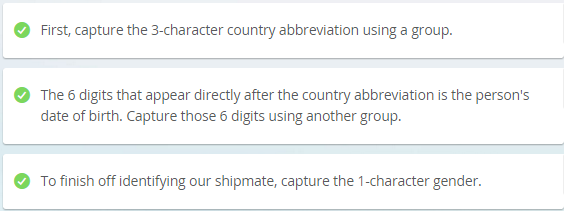We'll capture groups of characters we wish to match, use quantifiers with those groups, and use references to those groups in String.prototype.replace.
Let's see we have set of similar string starting with 'foo'
var str = ` foobar fooboo foobaz `;
And what we want to do is replace any 'foobar' & 'foobaz' with '**foobar**' && '**foobaz**' :
var str = ` foobar fooboo foobaz `; var regex = /foo(bar|baz)/g; console.log(str.replace(regex, '**foo$1**')); /* " **foobar** fooboo **foobaz** " */
$1, capture the gourp and save into memory.
Another example:
Let's say we what to get the area code for each number.
var str = `800-456-7890 (555) 456-7890 4564567890`;
So the result for the input should be '800, 555, 456'.
Todo this,
first: divide those number into xxx xxx xxxx, 3 3 4 group:
var regex = /d{3}d{3}d{4}/g;

Second: now the only last one match, because, between group, there can be 'empty space' or '-':
Use:
s // for space - // for - [s-] // for select one element inside [], so s or - [s-]? // 0 or more
SO:
var regex = /d{3}[s-]?d{3}[s-]?d{4}/g;

Third: we need to match ():
(? // match (: can be 0 or 1 )? // match ) : can be 0 or 1
SO:
var regex = /(?d{3})?[s-]?d{3}[s-]?d{4}/g;

Last: we need to capture the first 3 digital number group. use (xxx):
var regex = /(?(d{3}))?[s-]?d{3}[s-]?d{4}/g;
then console.log the captured group:
console.log(str.replace(regex, 'area code: $1')) /* "area code: 800 area code: 555 area code: 456" */
Example 3:
re-format the number to xxx-xxx-xxxx:
var str = `800-456-7890 (555) 456-7890 4564567890`; var regex = /(?(d{3}))?[s-]?(d{3})[s-]?(d{4})/g; var res = str.replace(regex, "$1-$2-$3"); console.log(res); /* "800-456-7890 555-456-7890 456-456-7890" */
------------------
As we said, (xx) actually capture the group value and store into the memory, if you don't store tha reference into the memory, you can do:
(?:xxx) // ?: won't store the reference into the memory console.log(str.replace(regex, 'area code: $1')) /* "area code: $1 area code: $1 area code: $1" */
-----------------------------

-----------------

(^d{2}/d{2}/(?:2015|2016) (d{2}:d{2}$))

------------------------------

/((?:sword|flat|blow)fish)/gim

--------------
Grab Your Passports

/d{9}d([A-Z]{3})(d{6})d([a-z])d{23}/gim
